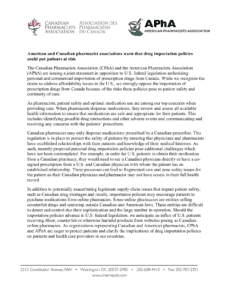Drug Importation in Connecticut: An Overview

Synopsis:
The Connecticut legislature has not yet advanced bills that have been introduced to legalized importation of drugs from Canada. However, in 2019 the state budgeted funds for the Department of Consumer Protection to hire a project manager to submit a request for approval for a Canadian Prescription Drug Importation Program to the federal Secretary of Health and Human Services.
Current status:
Budget documents indicate that Connecticut will be submitting an importation plan to the Department of Health and Human Services in 2020 or 2021.
How should we evaluate this program?
The program hasn't started yet, or even been designed, so there's no way to measure whether it saved money or kept patients safe, both promises made at the time of passage. However, the 2003 Medicare Modernization Act contains requirements for safety requirements built into any such program.
Official actions and statements
Connecticut has made no official statements regarding importation.
Background / resources
Learn more about
- The Drug Importation Debate
- Fake Medicine in Connecticut
- The Importance of U.S. Closed Drug Supply Chain
Testimony Opposing Importation
- Testimony of Shabbir Imber Safdar, PSM Executive Director at Connecticut's Health Care Affordability Informational Forum, November 14, 2019
Op-eds from the Experts
Counterfeits coming from Canada have been a big issue in the Sunshine State. The FDA has identified dozens of counterfeit drugs coming into Florida from foreign pharmacies.
“Several other states have attempted to legalize drug importation, but all have failed to show that it’s safe or saves money. The federal government has determined multiple times that drug importation can’t be done safely. I hope, for the sake of Floridians, that state policymakers come to that same conclusion.”
In this editorial, published in The Missouri Times on March 11, 2019, Gregg Keller warns that “the issue at hand is not so much the safety of Canadian drugs but the dangers of the global drug trade. Often, pharmacies that claim to be “Canadian” are anything but.”
In this March 5, 2019 editorial, published on the National Association of Manufacturers blog, Robyn Boerstling, the organization’s Vice President of Infrastructure, Innovation and Human Resources Policy, raises concerns about Florida’s drug importation proposal.
It isn’t just policymakers who believe drug importation will open the U.S. drug supply to counterfeits. In this editorial, published in the Times of Northwest Indiana on March 6, 2019, HIV-positive advocate Brandon Macsata explains that his own physician objected to ordering medicine from Canadian online pharmacies:
“It never crossed my mind that I might have been taking counterfeit medicine, or that the medicines meant to control my HIV could be compromising my immune system. So when my doctor found out, she told me to stop immediately. She warned me that online pharmacies often sell counterfeit drugs.”
The Canadian Pharmacists Association (CPhA) and the American Pharmacists Association (APhA) have issued a joint statement in opposition to U.S. federal legislation authorizing personal and commercial importation of prescription drugs from Canada.
“While we recognize the desire to address affordability issues in the U.S.,” they write, “we strongly oppose the importation of prescription drugs from Canada because of the risks these policies pose to patient safety and
continuity of care.”
In this
In this February 4th, 2019 editorial for Colorado Politics, Denver resident Ali Schroer warns, “I experienced firsthand the dangers of counterfeit, imported drugs, and was critically ill for months as we sought to uncover the source of my illness.”
In this editorial, which first appeared in The Washington Times on January 29, 2019, former FBI Director Louis J. Freeh revisits the problem drug importation poses to law enforcement and regulatory systems already overburdened by the opioid crisis.
In this January 30, 2019 editorial, which was published in the National Association of Manufacturer’s Shopfloor blog, Vice President of Infrastructure Robyn Boerstling warns that even though legislators have good intentions, importation could “result in disastrous outcomes.”







